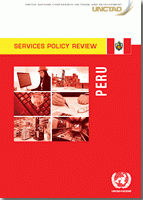
A Services Policy Review examines economic and trade policy aspects of selected services sectors identified by the Government and provides an evidence-based approach to policymaking on services by reviewing policy, regulatory and institutional issues and options with a view to assisting the beneficiary in developing a coherent and comprehensive strategic framework for services. In close partnership with the Government, research undertaken by UNCTAD and at the national level is integrated into the results of national stakeholder consultations to yield policy recommendations for action.
The Government of Peru identified the following four services sectors to form the focus of this Services Policy Review: computer-related services, focusing on outsourcing; engineering services, emphasizing aspects related to consulting; accounting and bookkeeping services, focusing on outsourcing; and logistics services. These services have the potential to contribute significantly to diversifying Peruvian exports and, in the case of logistics services, promoting export competitiveness.
This Services Policy Review highlights the fact that the main obstacles affecting the growth of Peru’s services supply include the following: difficulties in accessing financing, particularly for small and medium-sized enterprises; infrastructure shortcomings, particularly with respect to telecommunications and transport; lack of access and absorption of technology; and limited cooperation between the academic and business sectors.
Proposed recommendations for maximizing development benefits from services sectors include the following, among others:
Complement the current trade promotion strategy with supply-side measures to support the development of a competitive services offer, with special attention to smooth integration with other policies such as for industrial development, competition, consumer protection and intellectual property.
Adopt education policies at the university level to produce well-prepared professionals, aligned with the current needs of service industries, for instance by encouraging local universities to improve their programmes and obtain international certification and appropriate accreditation for engineering programmes and by designing a scheme to certify the experience and skills of young engineers.
Enhance commercial intelligence programmes for small and medium-sized enterprises, to include access to financing and capacity-building on trade and fiscal factors affecting export potential.
Proposed recommendations for improving the contribution of the specific sectors analysed in this Services Policy Review include the following, among others:
Strengthen the institutional framework to support micro and small enterprises in the computer-related services sector.
Develop operative market plans for computer-related services, including interlinkages with growing services and services that demand computer-related services such as retail services, in order to identify further opportunities for the sector.
Promote partnerships between smaller and bigger accounting firms.
Develop a long-term plan for the logistics services sector, changing the traditional modal orientation to a comprehensive view including transportation, infrastructure, services and logistics.
Develop a policy framework to strengthen domestic supply and exports of engineering services by strengthening educational offers of engineering specialties in the mining and energy sectors (including gas, petroleum and electricity) and civil engineering.


